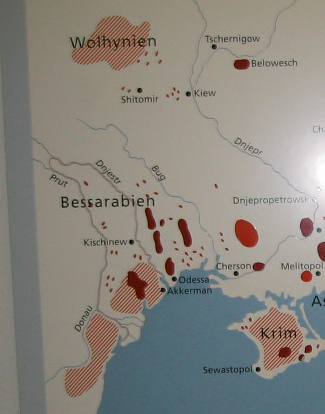German - Russian's MEMORABILIA Continued:
MAP of GERMAN COLONIES in RUSSIA
1700 to 1940s
 *
*
Bessarabia Colonies were in the southern part from 1812/14 to 1918. After WWI the area became part of Rumania, after WII the area once again was part of USSR [Russia], now, 2003, part of this area is part of Ukraine. Many of the German-Russians no longer lived in Bessarabia after 1940s. Many German-Russians were deported to Germany abt. 1940. Those who remained were absorbed in the Russian world, or were imprisioned, or executed, or sent to Siberia, or, .... disappeared.
It is said between 1918 and 1956 millions of German-Russians "Kulacks" were eliminated by the Communists.
 *
*
This part of Russia extended from the mid section of old Russia showing part of the Black Sea to the east showing the Caspian Sea. This section is showing the more of the German-Russian Colonies. The fate of the German-Russians would end up being no different than those in Bessarabia, accept they were not offered deportation to Germany.
Many fled into Manchuria, China or found boats of all shapes and sizes that carried them away....
One of the stories I heard showed the desperation of people fleeing the Red Army during the Russian Revolution of 1918: "I watched a man herding horses which his fallen comrades no longer could use. The man had said he would not allowe the Red Army to take these horses. The man herded the horses into the sea and guided them toward Japan. They slowly became smaller and smaller as they swam. Then they vanished. We all knew they couldn't make it to Japan. The man was a hero. I wish he had told me his name." The person speaking, however, wishes to remain unnamed. Her own story was just as dramantic. Her father had gotten them aboard a ship headed, they thought, to the USA. When the ship reached land they thought it was the USA so everyone cheered and felt the spirit of joy. The passengers were told to leave the ship with only what was on their backs... The ship sailed away with all their posessions. They were left alone and without one slice of bread on the coast of Mexico. The woman's eyes showed tears. My imagination could fill in the void between that moment they were abandoned to the moment they arrived as illegal aliens in San Francisco, CA. .
There are so many stories. The horror within the tales are all true. What is even more horrible, this woman and her family were the lucky ones. The millions who remained in Russia perished. Frozen bodies were stacked like cordes of wood in the concentration camps. No one knew their names. Those who may have uttered a prayer probably died....
The surviving German-Russians are scattered all over the world. And, museums like
Heimatmuseum der Deutschen aus Bessarabien
Florianstraße 17
[Florianstrasse 17]
D-70188 Stuttgart
Germany
fon [phone] 0049-711-262 5481
fax 0049-711-262 8092,
show the history of the German-Russians from Bessarabia.
*From Alfred Hein's![]() Photo
Collection - 2003
Photo
Collection - 2003
 Hein. Genealogy Hein. Genealogy
|

|

|

Hubert |

Schweikert Genealogy |